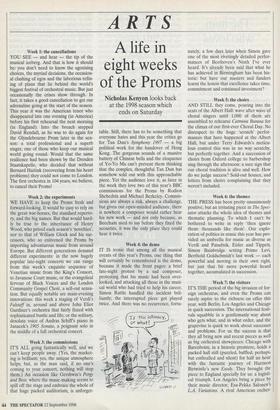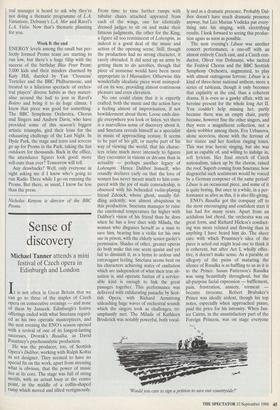ARTS
A life in eight weeks of the Proms
Nicholas Kenyon looks back at the 1998 season which ends on Saturday Week 1: the cancellations YOU SEE — and hear — the tip of the musical iceberg. And that is how it should be: you don't need to know the agonising choices, the myriad decisions, the occasion- al clashing of egos and the laborious refin- ing of plans that lie behind the world's biggest festival of orchestral music. But just occasionally the crises show through. In fact, it takes a good cancellation to get our adrenaline going at the start of the season. This year it was the American tenor who disappeared late one evening (in America) before his first rehearsal the next morning (in England). Into the breach stepped David Rendall, as he was to do again for the Glyndebourne Prom later in the sea- son: a total professional and a superb singer, one of those who keep our musical world going round. Would that the same resilience had been shown by the Dresden Staatskapelle, who decided that without Bernard Haitink (recovering from his heart problems) they could not come to London. The first orchestra in 104 years, we believe, to cancel their Proms!
Week 2: the experiments WE HAVE to keep the Proms fresh and forward-looking. It would be easy to rely on the great war-horses, the standard reperto- ry, and the big names. But that would hard- ly be true to the inheritance of Henry Wood, who prized each season's 'novelties', nor to that of William Glock and his suc- cessors, who so enlivened the Proms by importing adventurous music from around Europe. But different generations demand different experiments: in the now hugely popular late-night concerts we can range from this week's exquisite sequence of Venetian music from the King's Consort, to Javanese Court music, or the evangelical fervour of Black Voices and the London Community Gospel Choir, a sell-out sensa- tion. But equally notable are main-evening innovations: this week a staging of Verdi's Falstaff in, around and above John Eliot Gardiner's orchestra that fairly fizzed with sophisticated bustle and life; or the solitary, desolate voice of Andras Schiff's piano in Janacek's 1905 Sonata, a poignant solo in the middle of a full orchestral concert.
Week 3: the commissions IT'S ALL going fantastically well, and we can't keep people away. (Yes, the market- ing is brilliant; yes, the unique atmosphere helps; but, as the man said, if no one's coming to your concert, nothing will stop them.) An occasion like Gershwin's Porgy and Bess, where the music-making seems to spill off the stage and embrace the whole of that huge packed auditorium, is unforget- table. Still, there has to be something that everyone hates and this year the critics go for Tan Dun's Symphony 1997 — a big political work for the handover of Hong Kong. The gorgeous sounds of a massive battery of Chinese bells and the eloquence of Yo-Yo Ma can't prevent them thinking that the complex, thoughtful Tan Dun has somehow sold out with this approachable piece. Yet the audience love it, as later in the week they love two of this year's BBC commissions for the Proms by Rodion Shchedrin and Michael Berkeley. Commis- sions are always a risk, always a challenge, but given our open-minded audience, there is nowhere a composer would rather hear his new work — and not only because, as Beecham used to say before they fixed the acoustics, it was the only place they could hear it twice.
Week 4: the demo IT IS ironic that among all the musical events of this year's Proms, one thing that will certainly be remembered is the demo, because it made the front pages: a brief late-night protest by a sad composer, protesting that his music had been over- looked, and attacking all those in the musi- cal world who had tried to help his career. Simon Rattle handled the incident bril- liantly; the interrupted piece got played twice. And there was no recurrence, fortu- nately, a few days later when Simon gave one of the most rivetingly detailed perfor- mances of Beethoven's Ninth I've ever heard. It's already been said that what he has achieved in Birmingham has been his- toric: but have our masters and funders learnt the lesson that excellence takes time, commitment and continued investment?
Week 5: the choirs AND STILL they come, pouring into the seats of the Albert Hall: wave after wave of choral singers until 1,000 of them are assembled to rehearse Carmina Burana for the climax of our first-ever Choral Day. No disrespect to the huge 'scratch' perfor- mances that have happened at the Albert Hall, but under Terry Edwards's meticu- lous control this was in no way scratchy, but perfectly together. And a succession of choirs from Oxford college to barbershop sing through the afternoon: a sure sign that our choral tradition is alive and well. How do we judge success? Sold-out houses, and letters from choirs complaining that they weren't included.
Week 6: the themes THE PRESS has been pretty unanimously positive, but an irritating piece in The Spec- tator attacks the whole idea of themes and thematic planning. To which I can't be bothered to write in reply 'then ignore them: thousands like them'. Our explo- ration of politics in music this year has pro- vided an umbrella for music as diverse as Verdi and Panufnik, Eisler and Tippett, Simon Bainbridge setting Primo Levi, Berthold Goldschmidt's last work — each powerful and moving in their own right, but just that bit more powerful heard together, accumulated in succession.
Week 7: the visitors IT'S THE period of the big invasion of for- eign orchestras, and even the Proms can rarely aspire to the richness on offer this year, with Berlin, Los Angeles and Chicago in quick succession. The international festi- vals squabble in a gentlemanly way about who gets what, and in what order, and the grapevine is quick to work about successes and problems. For us the success is that they all bring new and recent pieces as well as big orchestral showpieces: Chicago with Barenboim, in a historic premiere, holds a packed hall still (puzzled, baffled, perhaps, but enthralled and silent) for half an hour with the fantastic journey of Harrison Birtwistle's new Exody. They brought the piece to England specially for us: a logisti- cal triumph. Los Angeles bring a piece by their music director, Esa-Pekka Salonen's L.A. Variations. A rival American orches- tral manager is heard to ask why they're not doing a thematic programme of L.A. Variations, Debussy's L.A. Mer and Ravel's L.A. Valse. Now that's thematic planning for you.
Week 8: the end ENERGY levels among the small but per- fectly formed Proms team are starting to run low, but there's a huge fillip with the success of the birthday Blue Peter Prom: 5,000 kids and their minders charmed by Katy Hill, dazzled by Yan 'Clouseau' Tortelier and the BBC Philharmonic, and treated to a hilarious spectacle of orches- tral players' diverse habits as they materi- alise around the hall to join in Ravel's Bolero and bring it to its huge climax. I knew that piece was good for something. The BBC Symphony Orchestra, Chorus and Singers and Andrew Davis, who have provided some of this season's biggest artistic triumphs, gird their loins for the exhausting challenge of the Last Night. In Hyde Park, the stage and tents and screens go up for Proms in the Park, taking the fun outdoors for thousands. Back in the office, the attendance figures look good: more sell-outs than ever? Tomorrow will tell.
Any drawbacks? Well, only everyone in sight asking me if I know who's going to run Radio Three while I go on running the Proms. But there, as usual,. I know far less than the press.
Nicholas Kenyon is director of the BBC Proms.



































































 Previous page
Previous page